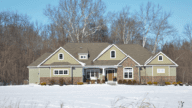What’s A Gated Community, Anyway? A Homebuyer’s Questions, Answered
- Published on
- 8 min read
-
 Summer Rylander, Contributing AuthorClose
Summer Rylander, Contributing AuthorClose Summer Rylander Contributing Author
Summer Rylander Contributing AuthorSummer Rylander is a freelance writer and editor with an abundant background in real estate. A former residential real estate agent in the Columbia, SC area and sales administrator at a commercial real estate firm, she now uses this experience to help guide readers. Summer currently resides in Nuremberg, Germany, where she fulfills her passions of food and travel and avoids her dislikes of mayonnaise and being trapped in an office.
-
 Sam Dadofalza, Associate EditorClose
Sam Dadofalza, Associate EditorClose Sam Dadofalza Associate Editor
Sam Dadofalza Associate EditorSam Dadofalza is an associate editor at HomeLight, where she crafts insightful stories to guide homebuyers and sellers through the intricacies of real estate transactions. She has previously contributed to digital marketing firms and online business publications, honing her skills in creating engaging and informative content.
During your home search process, you’ve probably come across the term “gated community” more than once. While it may seem obvious that gated communities are, well, communities with a gate, there are nuances to owning a home in one of these neighborhoods that you may not be considering as a prospective buyer. So, what is a gated community, exactly?
Fortunately, it’s not complicated, and we’re giving you all the details on what to expect from a gated community. Here to help is top Daytona Beach, Florida, agent Alice Cooper, who has helped many buyers in her area determine whether gated communities are right for them.
Let’s dive in!
What is a gated community?
Gated communities are residential housing areas — neighborhoods, estates, and so on — with controlled access.
Whether entrance is restricted by an actual metal gate, security personnel, a combination of the two, or some other type of barrier, the gist is the same: The general public cannot drive or walk uninvited into a gated community.
Residents within a gated community may share certain resources and amenities. These can include basics like trash removal and road maintenance, along with other perks such as a swimming pool, park, clubhouse or activity center, and more. Some gated communities may even operate on a shared energy grid.
Don’t confuse a gated community for a self-sustaining city, however. You generally won’t find retail stores, schools, or restaurants within a gated community — these developments are purely for residential purposes.
Gated communities tend to draw homebuyers who seek a heightened sense of security or exclusivity. It helps, too, to have a willingness to be neighborly because community residents tend to make collective decisions and look out for each other.
What are the origins of gated communities?
Published in 1995, Fortress America: Gated Communities in the United States lends insight into the beginnings of these unique communities.
Authors Mary Gail Snyder and Ed Blakely write that, “Gated communities are part of the trend of suburbanization, and their roots lie in the same urban design tradition. The suburb is a distinctly American form, but its roots can be traced to nineteenth-century England.”
The industrial era led to an increase in the intentional planning and design of residential developments. Suburban communities allowed workers a true reprieve from their duties — a place where families could enjoy peace, quiet, and cleaner air than could be found in the midst of a busy city.
Synder and Blakely credit Long Island’s New Brighton as the first developer-planned suburb in the U.S., which was marketed toward those who were affluent enough to afford a city commute. Already there was a sense of exclusiveness and having “made it” if one could achieve homeownership in a deliberately planned community.
“The suburb, sign of middle-class rank and position, has been city-averse from its beginning,” write Snyder and Blakely. “The English merchant, the American industrialist, and later the middle-class American worker all were trying to escape the city.”
Desire for the security and tranquility of the suburban lifestyle only grew with the rise of Frank Lloyd Wright and his elegant, innovative home designs. Gated communities are so intrinsic to Western culture that a 30-page thesis has been written about the relationship between gated communities and fiction.
While gated communities are most prevalent in the United States, equivalents can be found throughout the world. Many multi-generational housing developments, senior living centers, and condominium buildings are, in essence, their own examples of gated communities.
What are the benefits of gated communities?
Given the lengthy history and steadily growing popularity of gated communities, it’s clear that life in a gated community does have some advantages.
“They’re more exclusive, and there’s an inherent sense of security,” says Cooper. “And a lot of times, these communities will have amenities that you won’t find otherwise. It really comes down to the values of the buyer.”
Privacy
Certainly, you can expect a level of privacy when you buy a home in a gated community. Aside from the restricted access, neighborhoods are usually surrounded by fencing or lush vegetation that limits the ability to peer inside, let alone wander through recreationally.
Gated communities also tend to be built away from busy areas, so while you may be signing up for a slightly longer commute, you’re gaining additional privacy.
Safety
Aside from a protected entrance, some gated communities have enhanced security measures through video surveillance or regular patrolling of the neighborhood by security guards. This isn’t to say that life in a gated community automatically means you should adopt a leave-the-front-door-unlocked policy with your home, but it does mean that you can generally expect a lower risk of automotive break-ins, theft of items from your yard, and so on.
Depending on how guests and visitors are granted access, there may even be a log of who enters the community, which can lend a deeper feeling of security.
“Some people are very adamant that ‘I need to be in a gated community,’ and usually that is safety-driven,” notes Cooper.
Amenities
Amenities will vary from one gated community to the next, but features may include:
- A pool
- A fitness center
- A clubhouse for group meetings and events
- A park or playground
- Golf course access
- Security features
- Landscaping
- Trash removal and other cleaning
If you’re looking at a home in a gated community, your real estate agent will help you review the ins and outs of the neighborhood homeowner’s association (HOA) and its governing documents, which will detail exactly what is — and is not — included.
Higher home values
Because there are so many advantages to living in a gated community, homes in these neighborhoods tend to have higher values compared to similar non-gated homes in the area.
While this could mean a steeper purchase price for you now, it also means that your home is likely to increase in value and be in demand should you later decide to sell.
Well-maintained common areas
Maintenance of the common areas of a gated community is usually paid for through HOA dues, which means there’s a collective expectation and reliable follow-through that landscaping and shared building appearances will be tended to regularly. These duties are almost always executed by hired professionals.
Quiet; less traffic
Because gated communities are indeed gated, you won’t glance out the window to occasionally find a stranger using your driveway as a place to turn around when they realize they’re in the wrong place, nor will there be frequent traffic on neighborhood roads.
Walking and cycling traffic will also be limited to residents, as most gated communities do not allow passers through.
Sense of community
People who live in gated communities have — obviously — chosen to do so, and while your neighbors don’t have to become your best friends, it’s nice to be on good terms with the folks with whom you’re sharing common resources and expenses.
Many homeowners enjoy the sense of community they find in their gated neighborhoods, watching out for one another and lending a hand as needed. HOA meetings occur on a regular schedule but vary from one community to another. Some associations meet quarterly, others annually, providing residents with an opportunity to get together and resolve any common concerns.
What are the drawbacks of gated communities?
Gated communities can be great for some homebuyers, but it’s important to be aware of potential drawbacks, too.
Higher home prices
Yep, the same thing we just listed as an advantage can also be a disadvantage.
If the home you’re eyeing is in a gated community and has a higher price tag than a comparable property in a conventional neighborhood, you may need to make a larger down payment or seek a higher mortgage loan.
Additional expenses
Though not all HOA neighborhoods are gated communities, gated communities are definitely HOA neighborhoods — and HOA dues can be costly.
“In our area, normal HOA fees are typically around $500 to $600 per year, versus a gated community, where the costs are maybe upwards of $2,000,” says Cooper, who notes that fees for living in a gated community will vary depending on the size of the neighborhood and the amenities that are included.
If those amenities are especially relevant to your lifestyle, however, it could be worth doing some math. If your new neighborhood features a lap pool and a fully equipped fitness center, could you cancel your gym membership to help balance out those HOA costs?
More isolation
This drawback is the opposite of privacy as an advantage to gated communities — it really depends on your personal preferences.
Because gated neighborhoods do tend to be more isolated, you may feel disconnected from the wider community in your area. Geographically speaking, you may also have to drive a little further to get to work or shopping areas.
Some people see this as part of the exclusive charm of a gated community, while others may feel stifled or out of touch.
Complicated logistics for visitors
If you love to entertain friends and family at your home, know that it’s going to be more difficult to do so in a gated community. After all, the premise of the gate is to stop people from coming and going at all hours of the day and night.
So, depending on how access to your neighborhood is configured, you may have to meet guests at the gate or decide who is issued a regular guest pass (if the latter is even an option).
Visitor entry processes in gated communities, while designed for security, can sometimes pose challenges:
- Guard verification: Guests may experience delays as guards confirm their identification and contact the resident for approval.
- Guest lists: Residents are required to pre-register their visitors, which can be inconvenient if a guest arrives unexpectedly.
- Entry codes: While convenient for deliveries or regular visitors, shared codes may pose a security concern if not managed carefully.
Although these measures enhance safety, they can occasionally lead to frustrations, particularly for those who frequently entertain visitors or have last-minute plans.
Keep in mind that jumping through these added hoops will apply to service providers (technicians, repair specialists, and so on), childcare providers, food delivery drivers, anyone who may need to stop by to pick up an item you’re selling — everyone who doesn’t live in your neighborhood, basically.
For most people, this issue probably isn’t a gated community dealbreaker, but it’s definitely worth being aware of as a new reality.
Need for special keys
This point is also unlikely to derail anyone’s intent to write a purchase agreement, but it’s worth noting that you may need a special key or fob to gain access to your community.
What happens if you lose or damage this pass? What if there’s a technical glitch that prevents it from working properly?
Aside from potential replacement costs, you’ll want to ensure that there is someone you can contact for help 24/7, just in case you cannot unlock the gate at an odd hour.
Permission for home improvements
This one applies to most HOA neighborhoods, not just gated communities, but you’ll almost certainly need to apply for permission to make certain upgrades or improvements to your home.
Particularly if you want to make a change to the exterior of your house, you’ll need to go through the HOA — and, unless your request is very minor, you’ll likely have several rounds of approvals to go through.
Having to ask to make changes “is almost guaranteed,” says Cooper. “In most HOAs, you’ll have to get approval from the architectural board. And then in a gated community, the HOA requirements tend to be even more strict.”
Aesthetic consistency throughout the neighborhood is a standard goal of HOAs, so a gated community may not be right for you if you’re hoping to paint your front door bright orange, remove those faux shutters, or rip up the sod and pave over your front lawn.
And if you have a recreational vehicle, such as a boat or a project car to tinker with on weekends, it’s unlikely that you’ll be allowed to park outside of the home long-term.
So, if you’re previewing a house and notice something about the exterior that you think you might like to change if you were to purchase the property, or if you do have a unique parking situation, go ahead and talk to your real estate agent about these concerns early on.
They can help you read through the paperwork — or even speak directly with someone on the HOA board — and discern if the change is likely to be approved or denied.
Delayed emergency services
Though your gated community may have a special protocol for emergency services, do be aware that it might take longer for police, EMS, or fire services to reach your home.
If you or someone in your family has a chronic health concern, this may be an important point of consideration during your search for a new home.
How do I know if a gated community is right for me?
Gated communities tend to be a love-it-or-hate-it concept, but not always.
Many people can discern right away if the advantages of gated community living will outweigh the downsides. Conversely, they’ll know immediately that they’re not interested in living under the watchful eye of a planned community. But there is one further option if you’re still not sure if gated communities are right for you: You can let the house decide.
If gated communities are common in your area, your real estate agent will probably ask how you feel about them during the early stages of your home search. Feel free to keep an open mind — after all, there’s no harm in simply looking at a home in a gated community. Then, if you fall in love with a house in one of these neighborhoods, you can make the decision as you learn more about that particular community’s rules and regulations.
Above all, whether a gated community is right for you depends on your lifestyle and your family’s needs. If your loved ones have a standing invitation to “drop by anytime!”, if you enjoy being able to quickly pop into town for groceries or a night at the movies, or if the thought of regular neighborhood meetings makes you cringe, a gated community may not be your best option.
But if you enjoy an added layer of security, thrive on community, and love the idea of being involved in your neighborhood’s goings-on, a gated community might be perfect for you.
And, of course, affordability is key. Living in any neighborhood with HOA fees will add to your regular housing expenses, and if the extra costs of a gated community will uncomfortably stretch your budget, it may be time to rethink. Cooper encourages her clients to speak with a mortgage professional early in the homebuying process to fully understand their options.
From there, whether a home in a gated community is on the table or not depends on the individual.
“It really comes down to lifestyle and the cost of that lifestyle,” she says.
Header Image Source: (ArtisticOperations / Pixabay)




